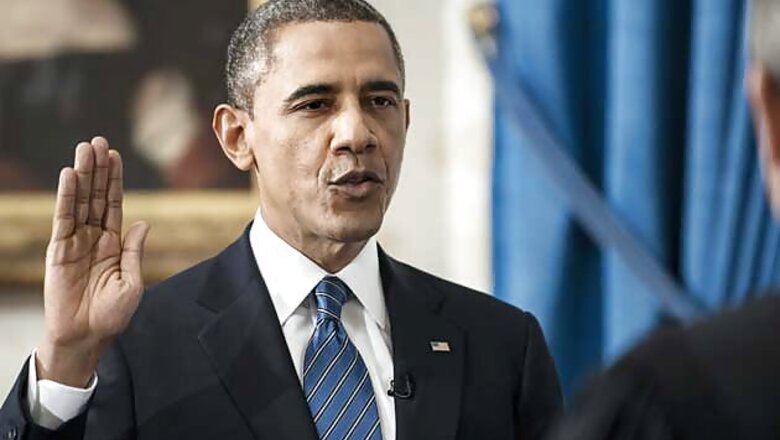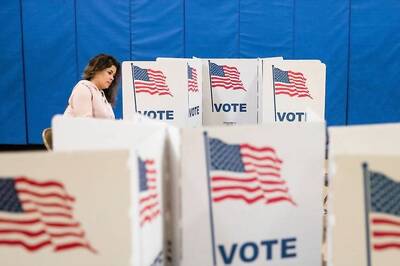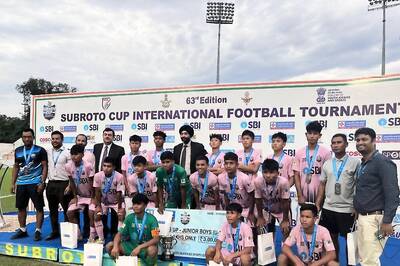
views
Barack Obama sworn in for his 2nd term: What can India expect? Foreign editor of Hindustan Times Pramit Pal Chaudhuri joined IBNLive readers for an interaction on the issue.
Q. As the ISAF guys are looking at a major Afghan pullout in 2014, leaving only a few thousand boots on the ground, what are India's expectations and is Obama likely to fulfill the same? Also how does he appease Pakistan and alleviate their fears at the same time? Asked by: Aryak Banerjee
A. The nature of the US departure from Afghanistan is one of the biggest concerns of the Indian foreign policy establishment right now. Why? Because part of the relative quiet we have faced on the Pakistani front is Islamabad's fears about what the turmoil -- Tehreek e Taliban and US military -- on its western border. Will a US departure mean a more assertive Pakistani policy on the Indian border again is a big question. Obama is focussed on withdrawal because of his belief that the US is overstretched and underfunded. He is not overly concerned about the consequences of his actions I fear.
Q. How do you think he is going to go about outsourcing now that he won't stand in another election? Asked by: Vinay Trivedi
A. Obama has always taken up the outsourcing issue as a populist tool whenever he is campaigning. At the policy level he has not taken up the temporary work visa issue at all. On the other hand, he has also not stopped the US Congress from restricting H visas or, more importantly, L visas. But I recently met the head of one of India's big three IT firms and he told me, "We have no visa issues with the US." Obama's plans for large scale immigration reform could be broadly beneficial for Indians however.
Q. Why does everyone make it seem as if India is highly dependable on the USA? & In reality how dependent are we? Asked by: Rafsan
A. I think "dependency" is a poor word to use to describe the relationship. Yes, the US economic relationship is by far our most important if you take all its elements together: remittances, FDI, FII, trade, etc. US investment has created more jobs in India than any other foreign investor. It is among our most important defence and intelligence relationships. The Saudis are giving us terrorist suspects because of Washington. China is treating us nicely (for now)in part because it fears an Indo-US alliance. And no other country could have broken the technology sanctions regime imposed on India because of its nuclear programme. This is easily the most important foreign policy relationship India has. But India is hardly a colony of the US. Americans themselves say we are worse than the French: we broadly agree with the US on most things, but are quite happy to vote against or spurn them if we are in the mood. The US tolerates this because, strategically, it feels India's rise is conducive to its interests.
Q. Can Obamait professionals helping hand in USA. Asked by: samsudin
A. Obama won't do anything against outsourcing, but he won't doing anything in favour. Joblessness is too sensitive issue for him. However, immigration reform is going to a large part of his domestic agenda. That will help those who wish citizenship and may ease some H visa issues.
Q. What according to you are 5 most important things Obama should be doing in his second term both at domestic and international level? Asked by: bhaz
A. I'll give three big things: 1) Get the US economy working again. The US government is running up huge debts to compensate for the lack of private spending. Obama wasted two years attacking US corporations who then refused to spend their billions in cash. He then focussed on healthcare which I would have put off for later. But the shale revolution could mean both an energy and a spillover manufacturing boom. 2) The Afghan withdrawal and a presently incoherent "rebalance to Asia" are the two biggest regional foreign policy plays of the US. But the outlines keep changing or remain unclear. Clarify, even if the policy is bad it will at least allow others to work out their own policies. 3) Obama, by most accounts, seeks a liberal renewal of US society. Healthcare, gun control and perhaps abortion are among the great moral debates he wants to settle. That is upto the US to decide. But I hope he is careful to understand that social issues like this should await good economic times. Otherwise, the US will be even more domestic focussed than it already is.
Q. What will be relations with india after Afghanistan pullout. Are they more supportive for India amid Pakistan may be flexing muscles to gain control on Afghan region ? Asked by: Prithviraj Chavan
A. The issue is really whether the US, in its desire to get out of Afghanistan quickly, is prepared to seek a deal with the Pakistan military -- ie allow the Taliban to rule in Kabul. That short-termism is what India fears. A US withdrawal that includes even continued financial support and limited military backing for a non-Taliban regime in Afghanistan is what India hopes for. If the US, instead, says lets just accept Rawalpindi's promises to "handle" Afghanistan for them then I think India and the US will go their separate ways on Afghanistan.
Q. Do you think that Obama's second term will be more beneficial to India than his first one? More particularly as regard to outsourcing and US stand on Pakistan sponsored terrorism? Asked by: Shyam Vadalker
A. The first two years of Obama's first term were strategically wasted because of his attempts to flirt with China (the G-2 policy). Relations recovered afterwards, though in his view India showed itself unable to fulfill its own promises after the passage of a flawed civil nuclear liability. The second term will probably see differences over the US's Afghan policy. But this is small fry compared to the problems caused by the G-2 policy. The real problem will be the domestic focus of both countries in the coming two years. They will find it difficult to focus on the small irritants that bother the relationship.
Q. Hi, 1.My question how will be Obama's approach towards Indian IT sector due to fiscal cliff which is yet to be faced by his administration 2.My second question: I am planning do my MS(Master Science)in 2013 in US.How will be jobs in forthcoming years to come? Asked by: SUDARSHAN NANDAKUMAR
A. As my previous answers mentioned, I don't think Obama will do anything in favour or against the IT sector. But that isn't good because it means the US Congress will attempt to restrict visas for populist reasons. Jobs in the US or in India? Broadly, I don't see the US job market recovering for a while because of the continuing unwillingness of the private sector to hire. But some sectors will thrive, like energy and technology. India has such a dearth of highly skilled labour that I don't think jobs for a qualified person will be a problem.
Q. What kind of reforms will Obama be pushing for immigration? Will it be more to stop illegal immigration or will it also facilitate the process in some way for those who want to immigrate? Asked by: Raghu
A. Obama will seek to fulfill a promise he made to the Hispanic American population which is to make it easier for immigrants of any variety to become US citizens. This would especially be true for qualified immigrants. Normally, opening such paths will include some strictures against illegal immigration if only to win congressional support. But the argument will be : open up more legal paths and illegal migration will dwindle anyway.
Q. What will Obama's stand be on the Indo-Pak relations? Asked by: Krishna
A. Obama and the US system intellectually accepts the argument that India makes that the main problem in Afghanistan-Pakistan issue is the Pakistan military. The army arrests the natural evolution of Pakistan and is forcing it into an Islamist path. It supports the Taliban and keeps Afghanistan on the boil. But this long-term strategy runs afoul of a short-term Obama desire to get the US out of Afghanistan quickly. Coming to an agreement with the Pakistan military, taking their promises to ensure Afghanistan never becomes an Al Qaeda base again, and then scooting then becomes a temptation for Obama. It remains to be seen whether the first trumps the second. So far it remains unclear. I am not optimistic given the character of the new security team in Washington, but I could be wrong.




















Comments
0 comment